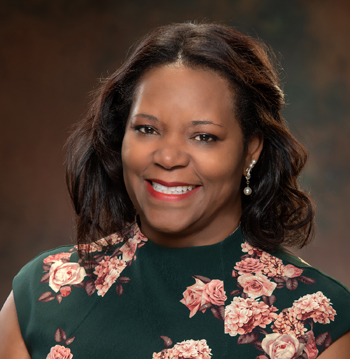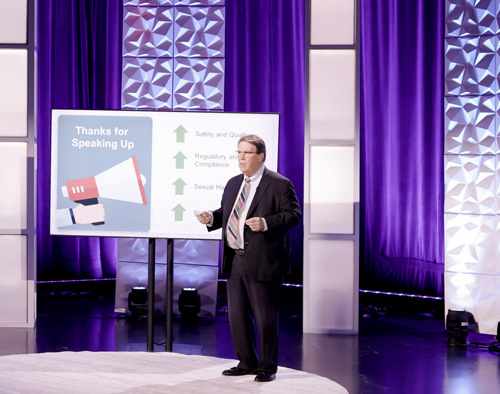by Holly Fletcher
Vanderbilt University Medical Center leaders are launching a transformational effort to foster an inclusive environment to ensure people at all levels of the organization experience a welcoming environment where everyone can thrive.
The multiyear initiative, structured around a comprehensive Racial Equity Plan, includes the integration of diversity, inclusion and health equity metrics into enterprise benchmarks to foster multicultural representation at all levels of the workforce, medical leaders said during streaming of the May Leadership Assembly.
The transformation will strengthen VUMC’s position as an international leader in research and clinical care by etching the actionable value set into the workforce and community.
“Our mission statement reads, ‘through the exceptional capabilities and caring spirit of its people, VUMC will lead in improving the health care,’” said Jeff Balser, MD, PhD, President and Chief Executive Officer for VUMC and Dean of Vanderbilt University School of Medicine (VUSM). “This transformational work will assure that our leadership is guided by a culture that lifts all races, all ethnicities and all other forms of diversity. Our leadership depends as much on who we are, as what we are.
“We will take decisive actions to ensure we are a Medical Center that assures diversity, equity and inclusion.”
The correlation between the Medical Center’s culture, well-being of the workforce, and quality goals dominated the final fiscal year 2022 Leadership Assembly.
The Time to Transform is Now
The Racial Equity Plan stems from a Racial Equity Task Force established in 2020. The Equity Plan will transform all areas of the Medical Center.

The plan is a roadmap for how to combat structural racism; recruit, retain and promote a racially and ethnically diverse workforce; and eliminate racialized medicine, said Consuelo Wilkins, MD, MSCI, Chief Equity Officer for VUMC and Senior Associate Dean for Health Equity and Inclusive Excellence for VUSM.
“The time to change is now. Lives depend on it. Racism and bias are present here and now. VUMC is moving along the continuum to become an anti-racist, multicultural institution that sets the standard for being equitable, not only for health care but for our communities. Diversity and equity matter, and now is the time to stake a stand,” said Wilkins.
Successful implementation will align the Medical Center with the mores of its workforce, said Balser. The effort prioritizes work that will require each member of the workforce to engage both personally and as teams, he said.
“Consider how we manage issues like central line infections, bond ratings or staff retention. We set annual goals for all of those indicators, and we make everyone aware of how we’re doing – here at our Leadership Assemblies and in many other venues. Starting today, we will do the same with measures of diversity, equity and inclusion. In my mind, these goals are not ‘nice to have.’ If we are serious about our mission to make health care personal, they are fundamental,” said Balser.
The Equity Plan will ultimately impact how care is delivered as the Medical Center pushes toward equitable care for its entire community and stands as a model in Middle Tennessee as an institution that invites and values people from all backgrounds and experiences, said C. Wright Pinson, MBA, MD, Deputy CEO and Chief Health System Officer.

“Dr. Wilkins has given us the roadmap. She has painted a great vision to take this from the amorphous to a workable plan for our organization. As we consider how to equitably deliver health care, each of us needs to think seriously about what our contribution can be inside ourselves and with others. What relevance can we bring to this situation? Our consideration, she pointed out, needs to be with humility, trust and curiosity, shifting mindsets and dealing with both internal and external resistance. In doing so, we will transform VUMC into a place where people not only want to work, but also choose to belong,” said Pinson.
Keep Speaking Up
The cornerstone of VUMC’s caring culture is to encourage the workforce to speak up with concerns, seek out help for stress and actively work to dispel sexual harassment. Intentional prioritization is spurring more people to speak up, said Pinson.
- Veritas reports and Integrity Line activity are up.
- The number of employees participating in education activities to learn about workplace sexual harassment and resources and engaging with the CARE Center are at an all-time high.
- The number of faculty and staff turning to the Employee Assistance Program for personal counseling and coaching is up nearly 20%.
“For the past two Leadership Assemblies, I have emphasized the need for people to speak up more related to violence and harassment, personal well-being, quality and safety issues, regulatory issues and simply sharing your ideas. Wonderfully, more of us are speaking up. We have an organization of people speaking up! This is an important piece of what employee engagement looks like to me,” Pinson said.
Leaders need to continue finding ways to promote psychological safety in their teams so people, especially those who haven’t felt welcomed or valued in the past, will have the confidence to lift their voices to keep VUMC performing safely and creatively, said Balser.
“Safety is not an event. It’s a continuous journey that demands our relentless focus, sacrifice and commitment. VUMC has a world-renowned culture of safety, and we will never stop searching for ways to improve — that’s who we are,” said Balser.
Cultivating VUMC’s Culture
An easy way to be heard is by taking the Culture Survey that went live on May 3. Results provide a composite of the attitudes and perceptions of the 30,000-person workforce, which is spread across an ever-growing number of campuses.
Results are taken seriously and guide Medical Center initiatives, Pinson said. Various departments across the enterprise have used the results as a blueprint for new programs that reflect the priorities of the workforce.
“This survey will provide valuable feedback about your feelings, about your work environment and our organization. VUMC is committed to a healthy and thriving work environment. The VUMC Culture Survey gives all employees a chance to tell us how people are thriving now, and also to tell us how we can make things better,” said Pinson. “Your feedback and your team’s feedback help set our collective course to make this a better and more inclusive place to work. No one has better ideas about how to make our work environment better than the people who work here.”
A responsive, inclusive culture is vital to the Medical Center’s top line goals of retention and productivity. VUMC functions optimally when it is fully staffed and healthy. Yet, Balser noted, those factors have taken a hit as COVID-19 stressed staffing limits and personal resilience. The phenomenon is not VUMC-specific, but an issue faced at health systems across the country.
To gauge and track the perception of inclusivity, the employee engagement survey will feature new questions to capture whether people feel they can be themselves, how it really feels to work at VUMC, whether they think they can be successful in the environment. “This is especially important for leaders because we all need to know whether our employees believe we are committed to creating an inclusive environment,” Balser said.





